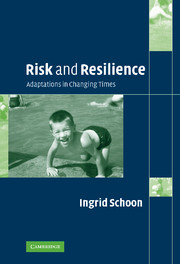Book contents
- Frontmatter
- Contents
- List of figures
- List of tables
- Foreword by Glen H. Elder, Jr
- Preface by John Bynner
- Acknowledgements
- Introduction
- 1 Risk and resilience: definitions
- 2 Towards a developmental-contextual systems model of adjustment
- 3 Persisting inequalities in times of social change
- 4 Selection, causation and cumulative risk effects
- 5 Protective factors and processes
- 6 Stability of early adjustment over time
- 7 Personal goals and life plans
- 8 Conclusions and outlook
- 9 Implications of findings for interventions and social policy
- Appendix A Two British birth cohorts
- Appendix B Response rates and handling of missing data
- Appendix C Description of variables used in the study
- References
- Index
Preface by John Bynner
Published online by Cambridge University Press: 22 September 2009
- Frontmatter
- Contents
- List of figures
- List of tables
- Foreword by Glen H. Elder, Jr
- Preface by John Bynner
- Acknowledgements
- Introduction
- 1 Risk and resilience: definitions
- 2 Towards a developmental-contextual systems model of adjustment
- 3 Persisting inequalities in times of social change
- 4 Selection, causation and cumulative risk effects
- 5 Protective factors and processes
- 6 Stability of early adjustment over time
- 7 Personal goals and life plans
- 8 Conclusions and outlook
- 9 Implications of findings for interventions and social policy
- Appendix A Two British birth cohorts
- Appendix B Response rates and handling of missing data
- Appendix C Description of variables used in the study
- References
- Index
Summary
Secondary analysis of large-scale longitudinal survey data enable hypotheses to be tested about the specifics of life, as in economists' studies of ‘returns to learning’, but rarely the testing of comprehensive developmental theory as a whole. The vagaries of question selection and design means that operationalisation of key theoretical concepts and the specification of their relationships can be weak in any given study employing secondary data. Such data is more often used to contextualise theoretical development rather than fit the models to which it translates to empirical data. Karl Joreskog's pioneering work on the development of structural equation modelling was a breakthrough in offering through the LISREL programme a solution to the statistical modelling problem but examples of applying it or its many variants, such as AMOS, in a comprehensive theory testing programme are relatively rare.
Ingrid Schoon's work using the 1958 and 1970 British birth cohort studies, datasets to test and develop further a ‘Developmental-contextual model’ of human development is a superb example of such theory testing in action. She starts from a life-course perspective that sees human development, as a dynamic process – part constructed through human agency and part shaped through the changing (proximal and distal) contexts through which the individual moves. From this she builds a developmental model, embracing the key concepts of risk and resilience, turning points and escape from adversity through the deployment of personal and social resources.
Information
- Type
- Chapter
- Information
- Risk and ResilienceAdaptations in Changing Times, pp. xvii - xviiiPublisher: Cambridge University PressPrint publication year: 2006
